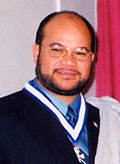As a journalist since 1969 (including a decade as CNN Radio's New York-based correspondent) I've reported, the good, the bad, the beautiful and the ugly. Now, as news and programming director at Paltalk.com I host a daily online show, News Talk Online, where I interview newsmakers and offer commentary. As with the show, this blog reflects my personal thoughts. I hope it stimulates rhetoric and debate. You are invited and encouraged to post comments.
Monday, April 7, 2008
David Keanu Sai Who Believes Hawaii Should Be An Independent Kingdom On Paltalk
Sai
There's actually a movement which argues that Hawaii is not, lawfully, one of the 50 states of the United States. A leader of that movement, David Keanu Sai, will be my guest on News Talk Online on Paltalk Friday April 11th.
Sai is the "acting interior minister" of the Hawaiian Kingdom government, which he says is operating "within the occupied state of the Hawaiian Islands."
Sai argues that since the Spanish-American War, his "nation" has been under prolonged occupation by the United States of America. He says the Hawaiian Islands "reluctantly" serves as the headquarters of the U.S, Pacific Command, largest of the nine unified military commands of the United States armed forces.
In 2001, the Hawaiian Kingdom Government filed a complaint against the United States with the United Nations Security Council over what it calls the U.S. occupation of the Hawaiian Islands.
To talk to Sai at 5 PM New York time Friday April 11th CLICK HERE. There is no charge.
Paltalk is the largest multimedia interactive program on the Internet with more than 4 million unique users.
News Talk Online is also syndicated by CRN Digital Talk Radio coast-to-coast across the United States to an additional 12 million households.
Subscribe to: Post Comments (Atom)




0 comments:
Post a Comment
Links to this post
Create a Link